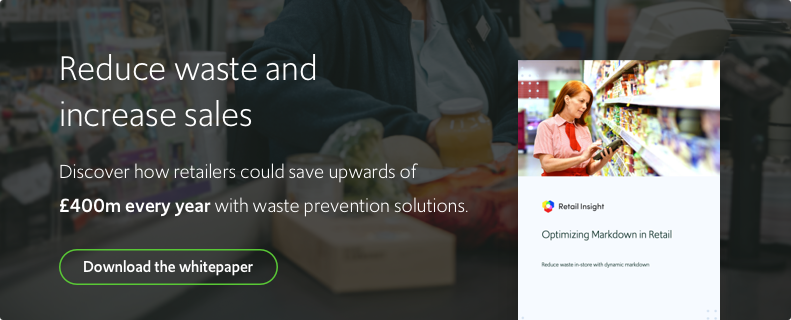
Sustainability, reducing retail waste, and increasing customer loyalty

- 1 minute read
- Paul Boyle
Even as the effects of the pandemic continue to be felt across the world, consumers still expect retailers to commit to and deliver their corporate sustainability and ESG targets. So much so that it has become an important factor in driving long-term loyalty. This is significant as the competitive battlelines of retail have become blurred amidst the pandemic-driven surge in online demand.
One of the more consistent themes in retailers’ sustainability strategies is reducing retail waste, an enormous challenge in the sector. Retail Insight’s own research estimates that UK retailers waste as much as £2.4 billion worth of food every year. Therefore, it is unsurprising that many retailers are investing in advanced technology solutions to reduce their wastage.
Why dynamic markdown technology is the key to reducing retail waste
A highly effective solution that retailers adopt is dynamic markdown technology. This method allows retailers to sell more while also reducing retail waste.
It leverages sophisticated technology that optimizes the discount of expiring products to maximize the sell-through without losing too much of the product’s value. The approach digests a range of different variables such as store location, time of day, product volume, and historical demand to produce a price in real-time to apply to the product.
The benefits of dynamic markdowns are vast and quickly achieved, including:
- More efficient reduction of expiring stock
- Reduced food waste costs
- Lower prices for customers at the checkout
It also allows retailers to reallocate food waste savings and reinvest them back into alternative sustainability priorities.
This extract was originally featured in the sixth 'Shape of Food Retailing in the New Normal' paper dedicated to 'Sustainability’.
Get in touch
Written by Paul Boyle
Paul, a Master's graduate in Engineering, became CEO of Retail Insight in 2011 having previously served as COO since the business was founded in 2005. He enjoys everything about Retail Insight; our people, products, and partners. Prior to Retail Insight, Paul worked at P&G and HJ Heinz in Commercial and Strategy.
You might be interested in


How Poor Markdown Pricing is Costing Millions

How tech can help grocers tackle food waste

Technology can help supermarkets become more sustainable

Grocers should do more to be sustainable, US shoppers say

Kroger collaborates with Retail Insight to reduce food waste

The realities of retailing in 2023

Rethinking retail food waste in the face of Covid-19

How to reduce retail shrink and pinpoint the root cause

An examination of shelf health at US grocers

Reshaping the supermarket post-pandemic


